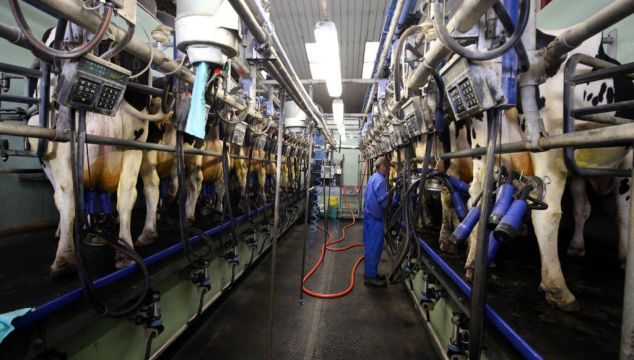The potential environmental impact of annually producing 450 million litres of milk to supply a proposed Co Kilkenny cheese plant should be treated as “significant indirect effects” of the development, the Supreme Court has been told.
The five-judge court has begun hearing an appeal by An Taisce/The National Trust for Ireland of a High Court ruling that upholds An Bord Pleanála’s June 2020 permission for Glanbia’s €140 million continental cheese factory planned for Belview. It is to be developed under a joint venture agreement with Glanbia’s Dutch partner Royal-A-Ware.
Crucial to the appeal is whether the planning board should have considered the plant’s upstream consequences, arising from off-site milk production, for the purposes of the Environmental Impact Assessment (EIA) and Habitats directives, said Neil Steen SC, for An Taisce.
Mr Steen said the provision of some 450 million litres of milk to the plant each year raises “serious concerns” about Ireland’s greenhouse gas and ammonia emissions, as well as nitrate pollutants affecting water quality.
He said the proposed factory will be supplied by 4,500 or so farms largely located in Co Kilkenny and the surrounding areas. The southeast, he said, is known to be a “hotspot” for nitrate pollution.
Indirect effects
His side accepts the supply of milk is not part of the development itself, but he said it could have “significant indirect effects” on the environment that should have been identified and assessed by the planning board.
Mr Steen said the EIA Directive “specifically envisaged” the offsite effects of a project being considered. This is evidenced to the extent that there is a provision for other EU member states to be informed when there is potential for a project’s impact to reach beyond national boundaries, he said.
An Bórd Pleanala and developer Kilkenny Cheese Limited dispute the claims.
Michael M Collins SC, for the board, said An Taisce has for the first time accepted that the milk production is not part of the project itself. He said there is now clarity about the “fundamental issue” of the case: where should the line be drawn when considering the relevance of an indirect effect.

Mr Collins said the thousands of milk suppliers have “no structural” link with the cheese factory and they will continue to be dairy farmers if the plant is not built.
A number of judges asked for further clarity from An Taisce on the issue of the “remoteness” of an indirect effect. Mr Justice Gerard Hogan asked about a hypothetical manufacturing plant whose products are later wrapped in plastic packaging. Should potential plastic pollution and littering be considered, he asked, adding: “Where can the court draw the line?”
An Taisce’s case is against An Bord Pleanála, the Minister for Communications, Climate Action and the Environment, Ireland, and the Attorney General, while Kilkenny Cheese is a notice party.
The case continues before Chief Justice Donal O’Donnell, Ms Justice Elizabeth Dunne, Mr Justice Séamus Woulfe, Mr Justice Peter Charleton and Mr Justice Hogan.







